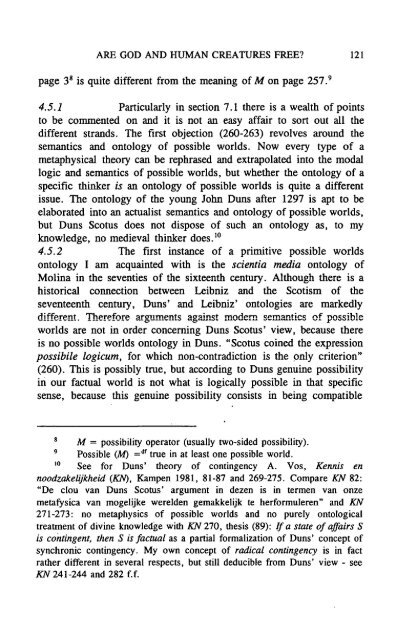Jaarboek Thomas Instituut 1997 - Thomas Instituut te Utrecht
Jaarboek Thomas Instituut 1997 - Thomas Instituut te Utrecht
Jaarboek Thomas Instituut 1997 - Thomas Instituut te Utrecht
You also want an ePaper? Increase the reach of your titles
YUMPU automatically turns print PDFs into web optimized ePapers that Google loves.
ARE GOD AND HUMAN CREATURES FREE? 121<br />
page 38 is qui<strong>te</strong> different from the meaning of M on page 257.9<br />
4.5.1 Particularly in section 7.1 there is a wealth of points<br />
to be commen<strong>te</strong>d on and it is not an easy affair to sort out all the<br />
different strands. The first objection (260-263) revolves around the<br />
semantics and ontology of possible worlds. Now every type of a<br />
metaphysical theory can be rephrased and extrapola<strong>te</strong>d into the modal<br />
logic and semantics of possible worlds, but whether the ontology of a<br />
specific thinker is an ontology of possible worlds is qui<strong>te</strong> a different<br />
issue. The ontology of the young John Duns af<strong>te</strong>r 1297 is apt to be<br />
elabora<strong>te</strong>d into an actualist semantics and ontology of possible worlds,<br />
but Duns Scotus does not dispose of such an ontology as, to my<br />
knowledge, no medieval thinker does."<br />
4.5.2 The first instance of a primitive possible worlds<br />
ontology I am acquain<strong>te</strong>d with is the scientia media ontology of<br />
Molina in the seventies of the six<strong>te</strong>enth century. Although there is a<br />
historical connection between Leibniz and the Scotism of the<br />
seven<strong>te</strong>enth century, Duns' and Leibniz' ontologies are markedly<br />
different. Therefore arguments against modern semantics of possible<br />
worlds are not in order concerning Duns Scotus' view, because there<br />
is no possible worlds ontology in Duns. "Scotus coined the expression<br />
possibile logicum, for which non-contradiction is the only cri<strong>te</strong>rion"<br />
(260). This is possibly true, but according to Duns genuine possibility<br />
in our factual world is not what is logically possible in that specific<br />
sense, because this genuine possibility consists in being compatible<br />
M = possibility operator (usually two-sided possibility).<br />
9 Possible (M) =df true in at least one possible world.<br />
10 See for Duns' theory of contingency A. Vos, Kennis en<br />
noodzakelijkheid (KN), Kampen 1981, 81-87 and 269-275. Compare KN 82:<br />
"De clou van Duns Scotus' argument in dezen is in <strong>te</strong>rmen van onze<br />
metafysica van mogelijke werelden gemakkelijk <strong>te</strong> herformuleren" and KN<br />
271-273: no metaphysics of possible worlds and no purely ontological<br />
treatment of divine knowledge with KN 270, thesis (89): If a sta<strong>te</strong> of affairs S<br />
is contingent, then S is factual as a partial formalization of Duns' concept of<br />
synchronic contingency. My own concept of radical contingency is in fact<br />
rather different in several respects, but still deducible from Duns' view - see<br />
KN 241-244 and 282 f.f.








